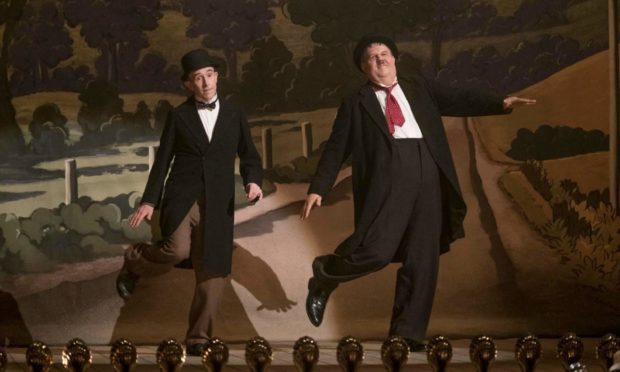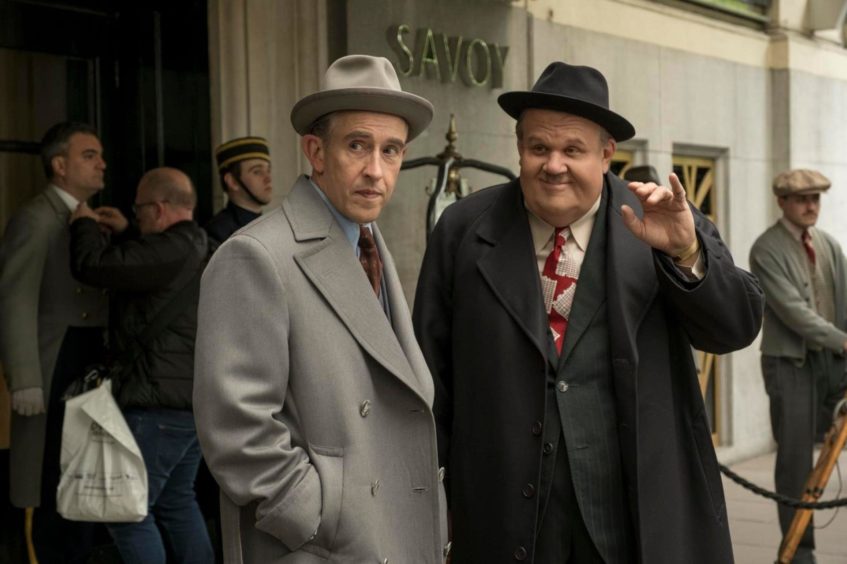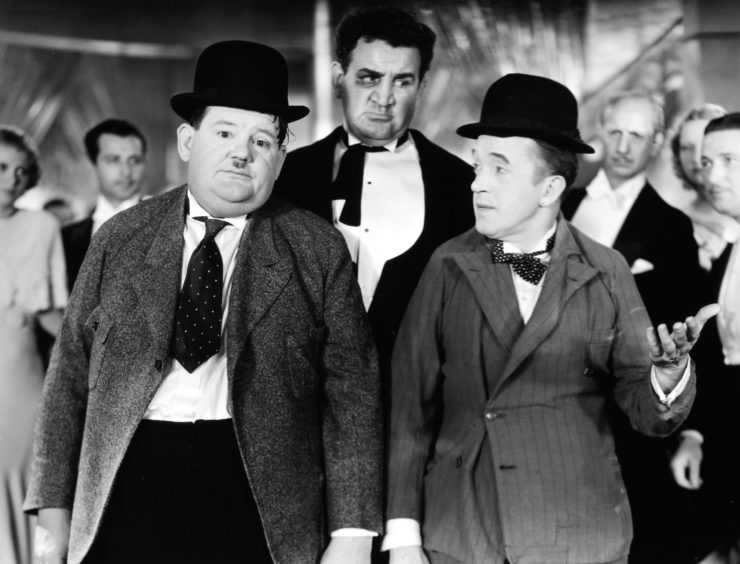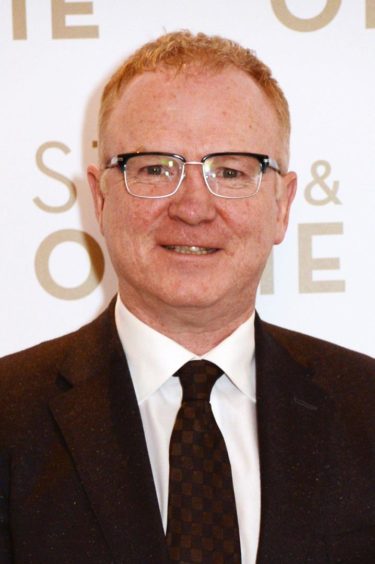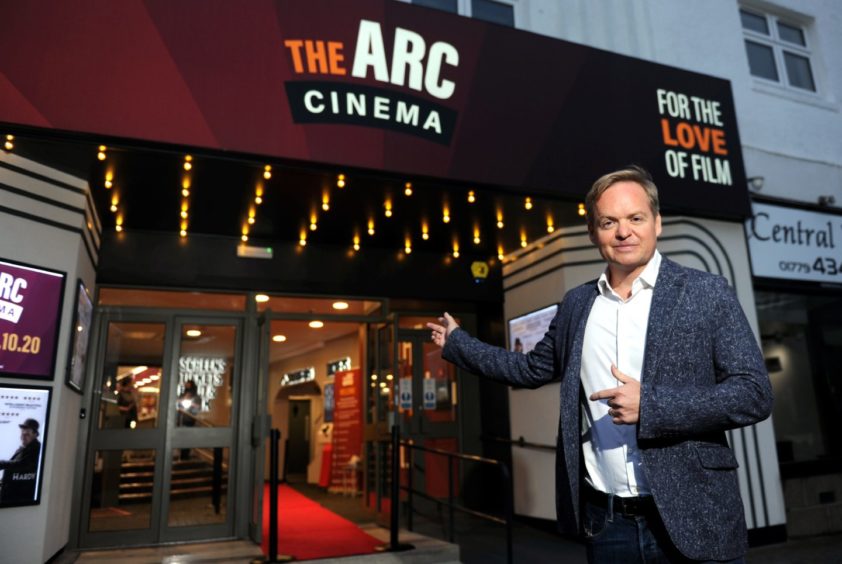It was a film which featured two of history’s most beloved comedy stars and re-created some of their famous routines with genuine love and warmth.
Although a few eyebrows were raised at the news that Peterhead-born Jon S Baird was directing the movie project about Stan Laurel and Oliver Hardy – his previous work Filth, an adaptation of Irvine Welsh’s controversial novel, chronicled the lead character’s descent into drink, drugs and debasement – nobody should have worried that the Scot might bring similar notoriety to old Hollywood.
After all, there’s a photograph dating back to the early 1980s, which highlights the beginning of Baird’s long journey from the Blue Toon to Tinseltown.
And it shows the youngster and one of his school friends, Steven Morgan, dressed up as Stan and Ollie with Jon as the former and his buddy – in a primitive fatsuit – playing the role of the rotund Mr Hardy.
At that stage, as the Peterhead man recalls, they were a pair of effervescent nine-year-olds who were delighted at the chance of mimicking the antics, mannerisms and idiosyncrasies of the duo whom they had watched while growing up in the north-east.
But, from that early age, and even as he developed a passion for celluloid and picture houses, he pledged he would return to those early days of the silver screen.
An unorthodox route to the directing world
Baird, who moved to London the day after his graduation from Aberdeen University to immerse himself in all aspects of film and television, began his career as a runner at the BBC and quickly progressed through the ranks.
He said: “I suppose I come from an unconventional background for a film director. My dad was a builder and my mum was a nurse, and I had an uncle who lived in the south of England, so we used to take holidays down there.
“When we were there, we always used to go to the theatre and see musicals, so from the age of five or six, I was really into performance. Then, as I got older, I gravitated towards cinema.
“I grew up in Peterhead, which was the kind of place where you don’t really tell anyone you want to be a filmmaker, I graduated from university, and kept my ambitions to myself, until I moved to London and a job at the BBC. Then, I worked my way up to researcher in the comedy department.”
On the trail of the lonesome pine
In 2004, Jon wrote, directed and produced his first short film, It’s A Casual Life, which led to him becoming associate producer on Green Street, starring Elijah Wood, in 2006.
His directorial debut feature, Cass, impressed many in the business. But it was his second feature, Filth, in 2013, which really made people sit up and take notice.
It didn’t just collect awards and acclaim from critics, but led to the Scot’s star rising throughout the industry to such an extent that he has subsequently worked with everybody from Danny Boyle to Martin Scorsese and is currently in the process of making a new big-budget film Tetris, partially shot in Aberdeen.
Prior to embarking on Stan & Ollie, which is being shown on the BBC on Friday, Baird enveloped himself in the history of Laurel and Hardy and explained why it meant so much to him and the rest of the cast and crew.
A film crafted from genuine love
He said: “From a very young age, I watched their films on TV after getting home from school, and they were just part of the DNA of our childhood.
“They were funny, they got into scrapes and they suffered misfortune, but they were innocents in the big wide world and they had the ability to make you laugh, no matter what age you were or how you might be feeling.
“The films also have a timeless quality about them which is why, even now, almost 100 years later, generations are growing up laughing at their antics.
“Charlie Chaplin is admired and Buster Keaton is respected, but Laurel and Hardy are loved and so we had to make sure that we told their story properly.”
The film provides a plethora of laughs and poignant interludes- and a cameo for Gothenburg Great Alex McLeish – as the action moves between the stars in their heyday in the 1920s and 1930s and their down-at-heel existence towards the end of their lives.
Baird added: “We decided at the outset that we didn’t want to make a straightforward biography. By the time they arrived in Britain, Laurel and Hardy were facing all manner of challenges: ill health, lack of money and the fact they had been forgotten about by many people, but their relationship thrived in adversity.
“This is one of the biggest themes of the film – that these were two men who loved
another and came to realise how much they loved one another before it was too late.
“I was overwhelmed by the response to the film and it was great to see the support I got from people in the north-east of Scotland.
“It makes all the hard work feel even more worthwhile”
Baird, a lifelong Dons fan and Doric speaker and champion, doesn’t remotely fit the common description of an overly controlling director.
‘We are all just children even when we’ve grown up’
He said: “The reason you make films in the first place is so that other people can see them. And I think it boils down to this: film-makers are really all just children who are drawing pictures for their mums and dads.
“You want validation for what you do, but sometimes it happens, sometimes it doesn’t.
“We all like a pat on the back and I think that’s true of most jobs, isn’t it?
“Then, when you’re finished with one project, you crack on with the next and try to do your best. It’s fair to say that it’s the fear of failure which constantly spurs me on.”
Stan Laurel appeared at Aberdeen’s famous Tivoli theatre
A young Stan Laurel was among the performers who trod the boards of the Tivoli Theatre in Aberdeen early in his career.
He and Charlie Chaplin, the comedian who became famous as “The Tramp” and for starring in films such as “City Lights” and “The Great Dictator”, were among the Fred Karno troupe who visited the theatre as a young man.
And while Laurel travelled to Britain in the 1950s with his long-time confrere, Oliver Hardy for the tour which is documented in Baird’s Bafta-winning film, he was not persuaded to embark on a comeback appearance in the Granite City.
However, Chaplin made a poignant return to the venue in the 1970s – after it had been turned into a bingo hall – and was photographed even as he was being interviewed by the late journalist Jack Webster.
The A-listed structure fell into such disrepair as the millennium came and went that it was added to the National Buildings At Risk register in the “critical” category.
However, redemption was at hand when the Tivoli Theatre company bought and transformed the property back to its former glory in 2009.
Stan & Ollie will be screened on BBC1 on Friday February 19 at 8.25pm.
